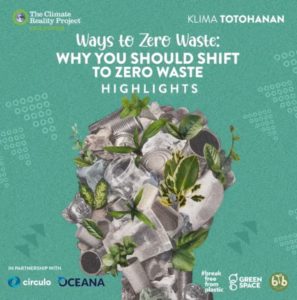The climate crisis is not just an environmental and development issue, but also a human rights issue that is indivisible to the sexual and gender minorities’ fight for equal rights and social justice.
This was highlighted during the special Pride Month episode of The Climate Reality Project’s Klimatotohanan webcast series entitled “Invisible, Ignored, and Ingenious: Lesbian, Gay, Bisexual, Transgender, Queer, Intersex, Asexual+ (LGBTQIA+) Pinoys in the Face of the Climate Crisis” which aired last June 19.

The episode featured Climate Reality Leaders, gender experts, and LGBTQIA+ advocates who underscored the need to address climate change through the lens of climate justice (linking the discourse on greenhouse gas emissions to equity and human rights) and intersectionality (recognizing that belonging to different social groups can affect the human experience, such as race, class, gender, and sexuality).
“The issue of gender recognition is a gender issue, but I think it is also a climate change issue,” said Ryan Silverio, Regional Coordinator for the ASEAN SOGIE (sexual orientation, gender identity, or expression) Caucus, a network advocating for the human rights of sexual and gender minorities throughout Southeast Asia.
Silverio said climate change has a direct impact on the lived realities of lesbian, gay, bisexual, transgender, intersex, and queer (LGBTIQ) persons, especially on the economic front.
“A lot of LGBTIQ folks work in precarious environments, working as freelance makeup artists, sex workers, etc. Because of discrimination, they can hardly find long-term jobs with security of tenure,” he said noting that sexual and gender minorities do not receive much support from the government when they lose their source of income in the aftermath of climate-related disasters.
Read: Youth in SE plays a critical role in climate action – experts
“Climate change affects each and every one of us but its effect is not the same for all,” Rachel Basas, Climate Reality Leader and Gender Consultant at the Asian Development Bank explained, as she also discussed how the climate crisis is compounding the struggles of the LGBTQIA+ community.
According to Basa, the LGBTQIA+ community may not have access to crucial assets, resources, and information prior to, during, and in the aftermath of climate-related disasters.
“For example, in preparedness efforts, they are not included in the list of government listing or any directory for aid or emergency response just because they do not fit the definition of a family—what the Philippines define as a family. So during disasters, they are unable to access government-provided relief or aid because they are not in that definition or category of what a family is,” she explained.
Adding another layer to these problems is the lack of representation.
“The LGBTQIA+ remains at the margins of policymaking offices and policymaking avenues. The voices are not heard. As such, the resulting policies, the resulting legislation, do not adequately respond to their needs. And that includes our climate and disaster policies,” Basa pointed out.
The Anti-Discrimination Bill, which aims to prevent discrimination against people based on sexual orientation, gender identity, or expression (SOGIE), has been languishing for two decades now in Congress.
“The passage of the SOGIE Equality Bill will enable us to plan for a rights-based and evidence-based response to climate-related disasters, the pandemic, and human rights violations,” Ferth Manaysay, Climate Reality Leader and Engagement Officer of the Climate Reality Philippines, pointed out during the webcast.
Also read: Climate Reality Leaders laud ADB plan to stop funding coal projects
Manaysay, who served as the host for the said webcast episode, also emphasized the need to broaden the scope of climate activism to include social justice issues, such as LGBTQIA+ rights. “Doing so would ensure that we are pushing for a genuinely transitional climate justice,” he added.
Klimatotohanan is a fortnightly Facebook webcast that features conversations and discussions about climate governance, science, solutions, research, and other related topics. To watch more meaningful discussions about climate and sustainability solutions, watch the full episodes of Klimatotohanan here.